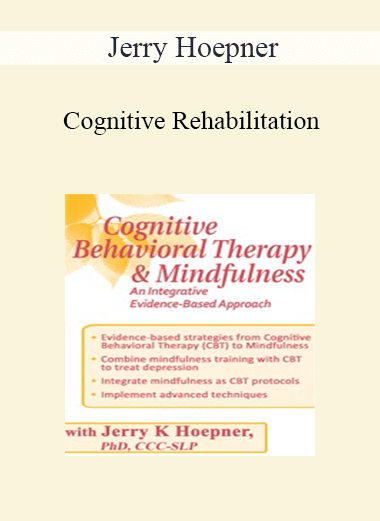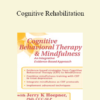$219.99 Original price was: $219.99.$41.00Current price is: $41.00.
[Instant Download] – Immediately deliver the download link after receiving the payment
 Purchase this course you will earn 41 Points worth of $4.10
Purchase this course you will earn 41 Points worth of $4.10Elevate your skills with the Jerry Hoepner – Cognitive Rehabilitation: Therapeutic Strategies for Effective Intervention course, available for just $219.99 Original price was: $219.99.$41.00Current price is: $41.00. on Utralist.com! Browse our curated selection of over 60,000 downloadable digital courses across diverse Uncategorized. Benefit from expert-led, self-paced instruction and save over 80%. Start learning smarter today!
[Instant Download] – Immediately deliver the download link after receiving the payment
Purchase Jerry Hoepner – Cognitive Rehabilitation: Therapeutic Strategies for Effective Intervention courses at here with PRICE $219.99 $41
- Faculty:
- Jerry Hoepner
- Duration:
- Full Day
- Format:
- Audio and Video
- Copyright:
- Feb 19, 2016
Description
| Webcast Manual (35.95 MB) | 115 Pages | Available after Purchase |
Outline
Cognitive-Linguistic Assessments
-
Screening tools
-
Cognitive evaluations (standardized and non-standardized)
-
Language assessments (standardized and non-standardized as they apply to cognitive assessments)
-
Rating scales (provider and consumer)
Cognitive Rehabilitation Techniques
-
Remediation / Compensation / Adaptation
-
Therapy decision-making (dynamic/ongoing assessment; patient centered; goal directed)
Documentation of Skilled Services
-
Justification for skilled, necessary and reasonable therapy
-
ICD-9 / ICD-10 codes pertinent to SLP intervention
-
SMART goals
-
Outcome measures
-
FIMS
-
NOMS
-
Relevancy to G-Codes
-
A guide for developing LTG’s
-
-
-
Key elements required for:
-
Daily notes
-
Progress notes
-
Attention
-
Posner’s Theory of Attention
-
Anatomic substrates of the attention system
-
Attention subtypes
-
Functional manifestations of inattention
-
Interventions strategies for promoting improved attention across recovery continuum
-
Remediation
-
Wakefulness (stimulation management programs)
-
Reduced agitation (validation therapy, environmental modification, positive psychology)
-
Increased function (direct attention training with reflection)
-
-
Compensatory strategies (partner-based supports, environmental interventions)
-
Adaptation techniques (assisted prompting)
-
-
Goal writing for attention deficits
Memory
-
Anatomy of the memory systems
-
Memory types
-
Encoding / Consolidation / Retrieval
-
Interventions for facilitating recall
-
Remediation
-
Utilization of preserved systems (spaced retrieval, routines, implicit learning)
-
Adaptation techniques
-
-
External aids
-
Task-specific learning
-
Goal writing for attention deficits
-
Executive Functions (EF)
-
Anatomic substrates of the EF system
-
McCloskey’s Executive Functions
-
Executive functioning hierarchy
-
Self-activation
-
Self-regulation
-
Self-realization
-
Self-determination
-
-
Functional manifestations of EF impairments
-
Specific focus areas for EF’s
-
Functional problem solving
-
Awareness / Insight
-
-
Strategies for reducing the effects of executive dysfunction
-
Remediation (Reflection, video self-modeling, Ylvisaker’s Goal-Plan-Do-Review)
-
Compensation (routines, environmental interventions, partner-based interventions)
-
Adaptation (cognitive prosthetics)
-
-
Goal writing for EF and problem solving
Visual Perceptual Function
-
Anatomy of the visual system
-
Warren’s Visual Perceptual Hierarchy
-
Functional manifestation of visual perception deficits
-
Therapeutic strategies specific to:
-
Low vision
-
Hemispatial neglect
-
Remediation (known quantities, metacognitive/self-regulatory interventions)
-
Compensation (environmental interventions, partner-based interventions, edgeness and bookness)
-
Adaptation (visual/attentional prosthetics)
-
-
Goal writing for visual perceptual impairments
Special Considerations
-
Delirium
-
DSM-5® criteria for delirium
-
The neuroscience of delirium
-
Diagnosing delirium
-
Protective, predisposing and precipitating factors for delirium
-
Reversible causes for delirium
-
Treatment techniques for delirium
-
-
Depression
-
Clinical manifestations of geriatric depression
-
Medications which can cause depression
-
SLP role in the management of depression
-
-
Right Hemisphere Dysfunction (RHD)
-
Assessment tools specific to RHD
-
Clinical manifestations of RHD
-
Left hemispatial neglect
-
Pragmatic impairment
-
Reduced awareness / insight
-
Cognitive impairment
-
-
Specific Therapy Activities
Case Studies
Faculty

Jerry Hoepner, PhD, CCC-SLP Related seminars and products: 5
Jerry Hoepner, PhD, CCC-SLP, is an assistant professor in the Communication Sciences and Disorders Department at the University of Wisconsin – Eau Claire. In that capacity, he teaches coursework in neuroanatomy, dysphagia, aphasia, acquired cognitive disorders, and counseling. Dr. Hoepner received his MS from the University of Wisconsin – Eau Claire and his PhD from the University of Wisconsin – Madison in Communication Sciences and Disorders. His current research examines the role of partners in supporting the success of everyday interactions of individuals with traumatic brain injury, aphasia and dementias. A second line of research examines teaching pedagogies and learner responses. Clinically, Dr. Hoepner specializes in the use of routines to reduce demands on working memory and executive functions. He co-facilitates Aphasia Camp and the Chippewa Valley Aphasia Group.
Speaker Disclosures:
Financial: Dr. Jerry Hoepner is an assistant professor and researcher at the University of Wisconsin Eau Claire. He receives a speaking honorarium from PESI, Inc.
Nonfinancial: Dr. Jerry Hoepner is on the board of directors for the Chippewa Valley Aphasia Group.
Purchase Jerry Hoepner – Cognitive Rehabilitation: Therapeutic Strategies for Effective Intervention courses at here with PRICE $219.99 $41
Cultivate continuous growth with the Jerry Hoepner – Cognitive Rehabilitation: Therapeutic Strategies for Effective Intervention course at Utralist.com! Unlock lifetime access to premium digital content, meticulously designed for both career advancement and personal enrichment.
- Lifetime Access: Enjoy limitless access to your purchased courses.
- Exceptional Value: Benefit from savings up to 80% on high-quality courses.
- Secure Transactions: Your payments are always safe and protected.
- Practical Application: Gain real-world skills applicable to your goals.
- Instant Accessibility: Begin your learning journey immediately after buying.
- Device Compatible: Access your courses seamlessly on any device.
Transform your potential with Utralist.com!
Related products
Uncategorized
Cognitive Rehabilitation Therapy: Practical Interventions and Personalized Planning – Jane Yakel
= 85 Points
Uncategorized
Legal Risks in Nursing Documentation – Use Extreme Caution When Skimming the Facts – Rosale Lobo
= 40 Points
Uncategorized
Disordered Eating Behaviors: Identify and Treat the Underlying Trauma – Lori Kucharski
= 85 Points
= 125 Points
Uncategorized
= 35 Points
= 72 Points
Uncategorized
Managing Patient Emergencies: Critical Care Skills Every Nurse Must Know – Dr. Paul Langlois
= 85 Points
= 85 Points





